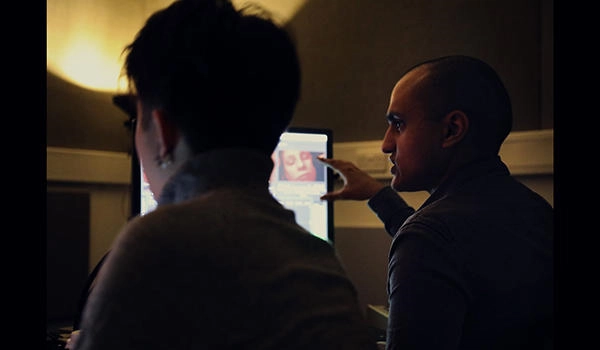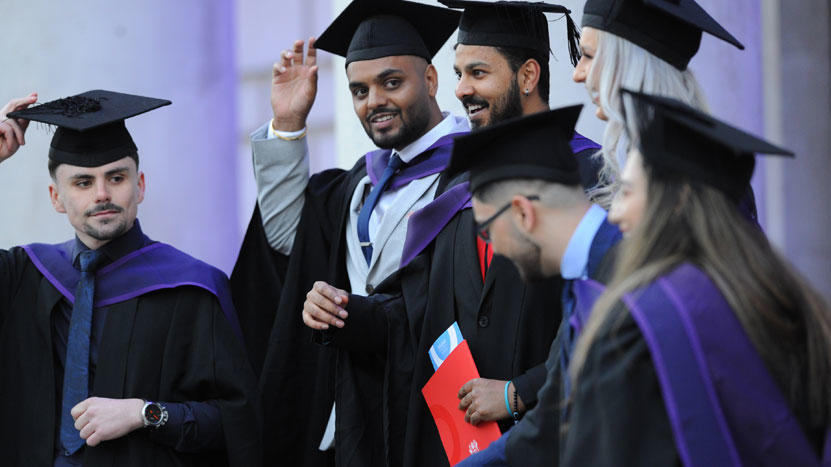
“Solent helped me achieve my career goals. While I still have room to grow and learn, I wouldn’t be here without them.”


Make your mark in the film and television industry. Build your creative post-production skills working with some of the best industry-standard equipment in a fun and creative environment
This course supports you to develop the skills and experience to seek new career opportunities in a wide range of creative fields linked to post production.
You’ll develop a range of practical skills throughout the course by using a range of industry standard software such as Adobe Premiere Pro and AVID Media Composer - alongside growing an understanding of key critical concepts through modules in areas such as Approaches to Post Production and Creative Editing for Pictures and Sound.
You’ll also have the opportunity to gain professional qualifications alongside your degree studies. You’ll be encouraged sit the Avid Certified User exam - a certificate recognised by post-production companies worldwide. You could also work towards gaining the Pro Tools Certified User certificate, if you wish to pursue a career in sound design or audio mixing.
We will provide, encourage and promote engagement with industry practitioners, and work with you to develop your own areas of interest which will lead into a final major project. Our post-graduate culture at Solent is practice-led, research informed and student driven. In the words of one of our many successful alumni, this course at Solent will help you build the skills, the reel, and the contacts.
The course team’s excellent industry links mean you’ll also have access to a long-established and inspiring guest speaker programme. Students on our media technology programmes have had the chance to meet and question some of the country’s top industry professionals in film and television. Recent guest speakers include Mick Audsley (BAFTA winning editor: Harry Potter and the Goblet of Fire, Everest, Allied, Twelve Monkeys), Eddy Joseph (BAFTA winning sound editor: Casino Royale, United 93, Charlie and the Chocolate Factory), Walter Murch (Oscar and BAFTA winning sound and film editor Tomorrowland, Apocalypse Now, Jarhead), Nick McPhee (editor: The Durrells, Downton Abbey, Doc Martin), Julian Unthank (screenwriter New Tricks, Sword of Vengeance) and John Lloyd (producer: QI, Blackadder, No Such Thing as the News).
This course offers additional qualifications for you to obtain with your degree
This course has access to specialist facilities
You can apply direct to Solent University for this course
After successfully completing your studies, there's an opportunity to continue your studies at Solent
You can study this course part-time
This course is ideal for anyone wishing to pursue a career in post-production. Candidates should have a first or second class degree in a related discipline. The programme would also suit those already working in the industry with relevant experience, looking to build on their existing knowledge and skills.
Graduates can expect to pursue jobs in many areas of the TV and film post-production industry.
Students have access to: over 70 fibre networked Adobe Premiere and FCP X edit workstations; over 30 Avid Media Composer edit workstations; post-production sound and colour grading suites; a range of high-end cameras and ancillary equipment – all in HD or 4K; a 5.1 surround ADR /Foley dubbing suite; and a Dolby Atmos cinema.
Our vibrant campus brings state-of-the-art facilities to enhance your learning and elevate your student experience. Our award-winning teaching building, The Spark is centred around students and offers a stimulating study environment with flexible learning spaces. Away from studying, why not try out the gyms, fitness studios and sports halls in our £28 million Sports Complex, or watch a blockbuster film at our student-run cinema with Dolby Atmos audio.
Acquire professional, industry-standard skills in planning and completing edits under different conditions and time restraints.
This module will continue to build on the skills learned in semester one, developing your practice in a range of fields as you begin to deepen your own understanding of your areas of interest and creativity as you find your voice as an editor. Working both individually and in groups, you will continue your analysis and engagement in film and television texts, contemporary work practices and industry networks as we explore and challenge the language of montage, film grammar and the professional practice of creative collaboration.
The Master’s Project can take a number of different forms depending on the discipline of the study investigated by the student. In each case, the student will be expected to present a project that critically synthesises approaches and methodologies within the discipline and demonstrates initiative and autonomy in its execution. This project is split in to two elements: The masters project or dissertation (this can be a straight thesis or dissertation with practice) and the Viva.
In this module you will plan and prepare an academic proposal for your masters project or dissertation. You will be taught how to successfully define, research and prepare for a substantial project or dissertation that will bring to life research in interdisciplinary creative practice. Traditional research-based skills and knowledge will be explored in relation to contemporary research methodologies. Within the module students will be introduced to diverse research methodologies and sessions will explore how research methods and practices can be applied in the context of critical analysis, academic debate and interdisciplinary creative practices.
The aim of the module is to equip you with an in-depth knowledge of your chosen industry and support you in gaining the insight and understanding to enable you to plan your long-term career. You will identify and engage with relevant work-related or research-focused work experience in order to strengthen your knowledge of your chosen industry and to allow you to develop and refine your professional skills. The module will be enhanced through your engagement with a programme of extra-curricular talks and workshops.
At Solent, our aim is to deliver innovative, inclusive and intellectually stimulating teaching to develop self-confident and highly employable graduates. All our courses are designed with employability in mind, which makes industry-based learning a priority.
The course is taught through workshops, individual tutorials, seminars, and research sessions.


Hear from Solent alumni about where their careers have taken them and how studying at Solent prepared them for their future.
Read more stories
“Solent helped me achieve my career goals. While I still have room to grow and learn, I wouldn’t be here without them.”

Transferable skills in TV editing and research, production management, and online content creation can also be applied to new media and advertising, as well as to teaching or research.
The international film and TV industries are an exciting, challenging and dynamic place to work. Spend on UK film and high-end TV production was £4.23bn in 2023, of which, £2.87bn was invested in 187 high-end television production (HETV) shows and £1.36bn was spend on producing 207 feature films.
The course team have excellent links with industry which has led to a guest speaker programme with talks from inspiring and leading industry experts, including:
Close links with the Royal Television Society, City Eye and Southampton Film Week, and you’ll have access to a varied programme of masterclasses and high-profile guest speakers.



Hear from Solent alumni about where their careers have taken them and how studying at Solent prepared them for their future.
Read more stories
“Solent helped me achieve my career goals. While I still have room to grow and learn, I wouldn’t be here without them.”

The Solent Careers team is committed to getting students into great careers.
While you are studying, the team can help you with finding work experience or placements, link you with a mentor, check your CV, or offer one-to-one guidance.
If you're in your final year, we also have graduate job opportunities just for Solent graduates.

6th
UK uni for sustained employment
Longitudinal Educational Outcomes, 2022
As part of our global alumni community, you can take advantage of a range of benefits.
Whether it's been days or decades since you left us, or you're soon to don your cap and gown, things are constantly changing at Solent. We're always innovating, but we're also immensely proud of our heritage. And that means you.

Research doesn't just live in publications and journals - the effects of groundbreaking research can be found everywhere you look. That's why research at Solent has always been firmly rooted in industry needs and real-world application.
Solent University prides itself on carrying out not only pioneering research, but also research that addresses real world problems. We offer opportunities to study for a Master of Philosophy (MPhil) or Doctor of Philosophy (PhD) degree in a number of areas.
At Solent, we want to help you achieve your best and discover new insights. Whether you're thinking about applying for a PhD, or already underway with your research studies, you'll find useful guidance and information in our research pages.
Research at SolentThe tuition fees for the 2025/26 academic year are:
For further information, please visit our tuition fees page.
While most course costs are covered by your tuition fees, some essential resources and optional extras may need to be paid for separately. These additional costs are listed below. For advice on budgeting and managing your money, please contact student.funding@solent.ac.uk.
The 2025/26 other costs are not yet available. For guidance, the 2024/25 other costs were:
Optional costs
Solent alumni are eligible for a 20% reduction of tuition fees if returning to study a postgraduate course.
Find out moreSolent University offers a range of bursaries and scholarships that provide financial assistance or waive fees for tuition or accommodation. Each bursary or scholarship has specific eligibility criteria. Check out our bursaries and scholarships pages to find out more.
Cost of living support
At Solent, we understand that the cost of living crisis may be of some concern. To help, we've put together some detailed information to show what support is available and how to make your money go further.
There is no charge to attend graduation, but you will be required to pay for the rental of your academic gown (approximately £45 per graduate, depending on your award). You may also wish to purchase official photography packages, which range in price from £15 to £200+. Graduation is not compulsory, so if you prefer to have your award sent to you, there is no cost. Extra guest tickets will go on sale after results publication and will be sold on a first-come-first-served basis. The cost per ticket is currently £15. Please note, we do not guarantee there will be any extra tickets available to purchase.
Please select an option below:
If you are applying from outside the UK, find information about entry requirements, visas and agents for your country here.
For further information about UK, EU and international qualifications, please contact admissions.
If you are applying from outside the UK, find information about entry requirements, visas and agents for your country here.
For further information about UK, EU and international qualifications, please contact admissions.
All international applicants need to be aware that the English language requirements to attend Solent University, and the English language requirements to obtain a visa from the Home Office, may be different. This means that if you meet the Solent University language requirement to gain a place on the course, you may still have to meet additional requirements to be granted with a visa by the Home Office.
We strongly advise all applicants to visit the Home Office website which outlines all the requirements for a successful visa application and to take a look at our course entry statement document.
An honours degree at2:2 or higher
Applications for postgraduate courses can be made at any time prior to the start of the course. However, we strongly recommend you apply at your earliest convenience.
Please ensure you upload the following mandatory documents with your application:
Applicants who do not have English as their first language will be required to demonstrate an approved level of proficiency in the use of the English language. The agreed minimum requirements for this course are:
Qualifications are checked before enrolment, and international students must bring their original certificates or certified copies when coming to study at the University.
Pre-Sessional English programme
The University also offers a pre-sessional English programme for international students who wish to improve their level of English before starting a degree course.


